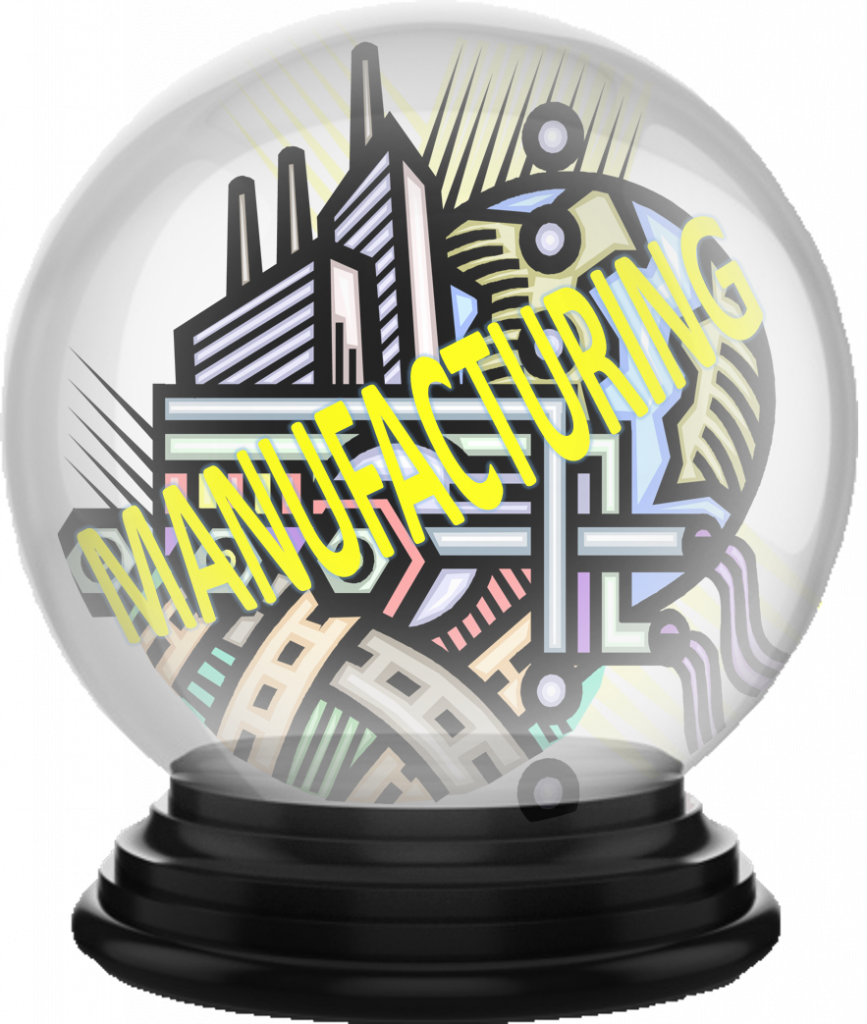Over half-a-dozen years ago, Brookings Institution analysts, Susan Helper, Timothy Krueger, and Howard Wial, asserted, “Manufacturing matters to the United States because it provides high-wage jobs, commercial innovation (the nation’s largest source), a key to trade deficit reduction, and a disproportionately large contribution to environmental sustainability.”[1] Those arguments still hold. Nevertheless, over the past few years there have been some significant changes in the manufacturing sector, including the maturation of additive manufacturing and the emergence of the Internet of Things (often referred to as the Industrial Internet of Things (IIoT)). Below are some of the predictions pundits are making about how the manufacturing sector will change in the years ahead.
Manufacturing trends
The changing manufacturing environment is often described as Industry 4.0 (i.e., the fourth industrial revolution). Jesper Bennike, CEO of GateHouse Logistics Company, notes, “A gamut of new Industry 4.0 technologies that interact, communicate and create lakes of vital freight information is now entering the supply chain and these will be instrumental in bringing about the smart supply chain.”[2] The smart factory is a huge part of that smart supply chain.
Robotics and automation. Robotics and automation have a long history in the manufacturing sector; yet, every year new innovations impact how things get made. Analysts from CB Insights note, “Robots/cobots are getting smaller, smarter, and more closely integrated with human tasks.”[3] Analysts from IQMS add, “Due to the chronic labor shortage in manufacturing coupled with increased demand high volume parts and assemblies, robotics adoption will grow rapidly in mid-tier manufacturers. Look for this trend to accelerate in 2019 as the fastest-growing manufacturers who have succeeded in winning new customers turn to robotics to fulfill the high volume orders of their new, and often foreign-based customers.”[4]
Cognitive technology. Shailendra Singh, Chief Operating Officer at MarketsandMarkets, asserts that artificial intelligence (AI) is “a key tool for improving quality, increasing speed and driving revenue growth.”[5] He also believes cognitive technology will be one of the most disruptive industry forces in the years ahead. Colin Masson (@colinmasson), Global Industry Director for Manufacturing Solutions at Microsoft Cloud and Enterprise, adds, “Throughout history, manufacturing and the products produced by manufacturers have been driven by technology. In 2019, technology is becoming smarter, with the cloud, IoT, AI, and machine learning delivering instant intelligence. Accordingly, manufacturing supply chains will become more intelligent in 2019, as well.”[6]
Advanced analytics. IQMS analysts write, “Look for 2019 to be the year where advanced analytics, BI, predictive analytics and machine learning apps and platforms enable manufacturers to operate from an integrated data model that capitalizes on legacy systems while providing more rigorous analytical tools.” Singh adds, “The rise in the integration of AI with big data and analytics systems is making both predictive analytics and prescriptive analytics much more pervasive.”
Internet of Things. The IoT is expected to experience continued growth. Joanne Phoenix (@drjoannephoenix) explains, “It is widely accepted that the Internet of Things market is growing at an exponential rate and becoming the norm for many, with 3.6bn connected devices used for daily tasks [in 2018]. In 2019, we can expect this growth to continue to spread. Boosted by 5G connectivity and advances in sensor technology, the manufacturing industry will see more IoT devices than ever before to drive forward the industrial revolution.”[7] Singh adds, “The internet of things (IoT) is rapidly revolutionizing the way organizations across all industries interact with their customers, achieve operational efficiency and optimize business outcomes.” In the manufacturing sector, IQMS analysts insist real-time monitoring is proving the value of the IoT. They explain, “Real-time monitoring creates a contextually rich stream of data that provides insights into product quality, machine performance, machine yields and holds clues to solving many manufacturers’ most challenging problems. 81% of manufacturers say real-time monitoring is improving their businesses today.” PwC analysts predict, “A significant portion of new sales growth for industrial equipment manufacturers in the immediate future will come from connected equipment with sensors, actuators, and analytical insights that can exchange critical data with other machines and computer networks in real time via the cloud.”[8]
Augmented reality. Augmented reality has started receiving a lot of press. CB Insights analysts predict, “Augmented reality could transform worker training and safety in complex manufacturing.” Phoenix adds, “The majority of manufacturers, or those working in the sector, have encountered some form of virtual or augmented reality in recent years. Whether it is quirky start-ups or large-scale global brands, we are set to see more of this technology incorporated into existing processes and products to enhance overall experience. We will continue to see new companies emerge, identifying innovative ways of adopting it, while established organizations will mine their business to uncover areas of improvement.”
Blockchain. According to IQMS analysts, “In 2019, blockchain’s greatest potential will emerge in manufacturing. Increasing visibility across every area of manufacturing starting with suppliers, strategic sourcing, procurement, and supplier quality to shop floor operations including machine-level monitoring and service, blockchain can enable entirely new manufacturing business models. Supply chains are the foundation of every manufacturing business, capable of making use of blockchain’s distributed ledger structure and block-based approach to aggregating value-exchange transactions to improve supply chain efficiency first. By improving supplier order accuracy, product quality, and track-and-traceability, manufacturers will be able to meet delivery dates, improve product quality and sell more. Manufacturers have the most at-scale deployments of blockchain today, leading all industries according to Capgemini.” Singh suggests a little caution may be in order when it comes to blockchain implementation. He explains, “There is a lot of potential growth for blockchain particularly in the smart contracts and digital identity applications but many challenges still need to be addressed and resolved, especially those related to the lack of commonly agreed upon operational standards, regulatory oversight and the large amount of investment required for infrastructure development and maintenance.”
Concluding thoughts
Industry 4.0 is about transforming Industrial Age enterprises into the Digital Age enterprises. PwC analysts conclude, “The primary aim at this point should be to get out in front of the digitization trend via strategies that let you free up capital to invest in emerging technologies that will enable a potentially significant revenue stream in the future.” The future of manufacturing is exciting and, as a new generation of workers sees it as more than blue-collar work, the manufacturing sector could entice some of the world’s brightest minds to join it.
Footnotes
[1] Susan Helper, Timothy Krueger, and Howard Wial, “Why Does Manufacturing Matter?” Brookings Institution, 22 February 2012.
[2] Haylle Sok, “Industry Trends fro 2019,” Global Trade, 27 November 2018.
[3] Staff, “Advanced Manufacturing Trends In 2019,” CB Insights, 2018.
[4] Louis Columbus, “Top 10 Manufacturing Trends For 2019,” IQMS Manufacturing Blog, 29 November 2018.
[5] Shailendra Singh, “Five Megatrends That Will Disrupt Every Industry Over The Next Five Years,” Forbes, 27 September 2018.
[6] Colin Masson, “The 6 trends that will define intelligent manufacturing in 2019,” Microsoft Industry Blogs, 19 October 2018.
[7] Joanne Phoenix, “Top 10 manufacturing trends for 2019,” Manufacturing Global, 7 December 2018.
[8] Marian Mueller, Steve Eddy, Reinhard Geissbauer, and Barry Jaruzelski, “Industrial Manufacturing Trends 2018-19, Strategy &, 2018.





